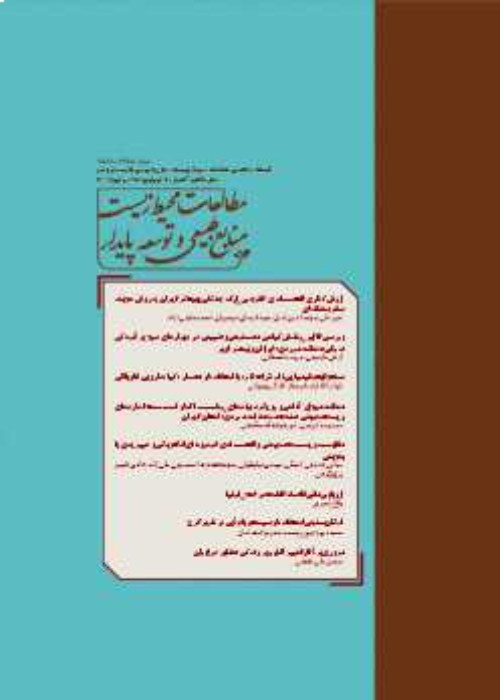Investigating the Effect of Wastewater and Well on Some Physical and Chemical Characteristics of Soil Fields
Author(s):
Article Type:
Research/Original Article (بدون رتبه معتبر)
Abstract:
Population growth and rising water demand make our country, which is part of the world's arid regions, on the brink of a crisis of water. Water scarcity is one of the challenges that the world faces today. Water resources constraints have attracted the attention of researchers and authorities to the fundamental use of unconventional waters such as saline water and urban and industrial wastewater. Among the low quality water sources, municipal wastewater is less expensive and considered attractive for irrigation in water-scarce regions. This wastewater is composed of 99.9% water together with small concentrations of suspended and dissolved organic and inorganic solids. It generally contains carbohydrates, lignin, fats, soaps, synthetic detergents, proteins and their decomposition products. It may also include a broad spectrum of contaminants such as macro- and micronutrients for plants, salts and specific ions, and inorganic substances, including a number of toxic elements such as heavy metals. The composition of wastewater, however, differs widely from place to place, even within a country. High energy costs, technology requirements and frequent problems with maintaining treatment plants render wastewater treatment ineffective for use in most developing countries. The results of water comparison showed nitrogen and acidity of wastewater were significantly higher than well water. The results of analysis of soil parameters showed that soil carbon in rice lands with an average value of 1.14 was higher than cauliflower with an average value of 1.01 and Soil acidity in cauliflower lands with a mean value of 51.5 was higher than rice land with an average of 6.9. On the other hand, all soil parameters of the fields that are irrigated with well water and wastewater have a significant difference. As a result, the water used to irrigate it has a direct impact on soil factors, so that soil factors in irrigated fields have higher values relative to irrigated wells. The presence of solids in sewage and municipal wastewater, by increasing organic carbon, salinity and reducing soil acidity, have caused changes in physical indices such as porosity reduction, permeability, water diffusion and water conductivity, or density increase, penetration resistance and soil density. The effect of changing the amount of these parameters on the soil is to destroy the soil structure, reduce the rate of penetration and movement of water, create runoff and soil erosion, which has an adverse effect on the plant due to reduced water holding capacity, reduced water and nutrient uptake, decreased growth And performance.
Keywords:
Language:
Persian
Published:
Journal of Environmental Studies, Natural Resources and Sustainable Development, Volume:2 Issue: 5, 2018
Page:
51
magiran.com/p1916117
دانلود و مطالعه متن این مقاله با یکی از روشهای زیر امکان پذیر است:
اشتراک شخصی
با عضویت و پرداخت آنلاین حق اشتراک یکساله به مبلغ 1,390,000ريال میتوانید 70 عنوان مطلب دانلود کنید!
اشتراک سازمانی
به کتابخانه دانشگاه یا محل کار خود پیشنهاد کنید تا اشتراک سازمانی این پایگاه را برای دسترسی نامحدود همه کاربران به متن مطالب تهیه نمایند!
توجه!
- حق عضویت دریافتی صرف حمایت از نشریات عضو و نگهداری، تکمیل و توسعه مگیران میشود.
- پرداخت حق اشتراک و دانلود مقالات اجازه بازنشر آن در سایر رسانههای چاپی و دیجیتال را به کاربر نمیدهد.
دسترسی سراسری کاربران دانشگاه پیام نور!
اعضای هیئت علمی و دانشجویان دانشگاه پیام نور در سراسر کشور، در صورت ثبت نام با ایمیل دانشگاهی، تا پایان فروردین ماه 1403 به مقالات سایت دسترسی خواهند داشت!
In order to view content subscription is required
Personal subscription
Subscribe magiran.com for 70 € euros via PayPal and download 70 articles during a year.
Organization subscription
Please contact us to subscribe your university or library for unlimited access!


